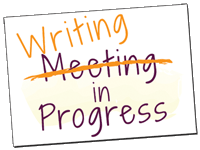Recently I came across this article on Study Hacks: Why “Write Every Day” is Bad Advice
Here’s what happens when you resolve to write every day: you soon slip up.
If you’re not a full-time writer, this is essentially unavoidable. An early meeting at work, a back-up on the subway, an afternoon meeting that runs long — any number of common events will render writing impractical on some days.
This slip-up, however, has big consequences.
It provides evidence to your brain that your plan to write every day will not succeed. As I’ve argued before, the human brain is driven, in large part, by its need to assess plans: providing motivation to act on good plans, and reducing motivation (which we experience as procrastination) to act on flawed plans.
The problem for the would-be writer is that the brain does not necessarily distinguish between your vague and abstract goal, to write a novel, and the accompanying specific plan, to write every day, which you’re using to accomplish this goal.
When the specific plan fails, the resulting lack of motivation infects the general goal as well, and your writing project flounders.
Although he is talking about those who write “on the side”, in many ways academics are not full time writers, either. I’m sure you could come up with a long list of common events that derail your plan to write every day, many of them important parts of your job.
Why do I still give this advice?
There is a useful distinction to be made between rules and principles. If making “write every day” a rule is a bad idea, is there anything useful about this advice? Yes. There is.
Writing regularly hones your skill.
Writing is a particular way of organizing and expressing your thoughts. It is a skill that improves with practice.
Of course, even if you are not working on writing an article, dissertation, or other research product, you probably do write every day. Reference letters, lectures, some of your email, comments on student work, papers for committees, and many other types of writing that you do every day use the same basic form of persuasive writing that your research writing does.
You would be hard pressed to identify a day in which you did not write something, even if your research per se is sadly neglected of late.
Priority and commitment
A second principle that underpins this rule is that if this particular piece of writing is important to you, then you need to make space in your schedule to do it. You’ll note that now we have shifted from writing as activity to writing a specific thing. If writing about your research and scholarship is important to you, then you must allocate time to doing that writing.
For some people, regular routines work well. Thus writing every day before they go into the office is a good way to build writing into their schedule. There is no need to look at your calendar to decide what to do today. You get up, have a shower, eat your breakfast, pour yourself a cup of coffee and go write for an hour (or 15 minutes). Then you pack your bag, and go into the university to teach, attend meetings, and whatever else is in the calendar.
For others, this just doesn’t make sense. You have to teach at 8:30 and your brain is not really functioning at 5 a.m. Or morning is just not your best creative time of day. Your other activities are not regular enough to make any time of day work as an alternative 5 days a week.
The key issue here is to make time. Put it in your schedule. If you work best in big blocks of time, then block out writing blocks before your schedule fills up with meetings. You can’t rely on those blocks magically appearing if you don’t actively protect them. If you like to write in shorter, more frequent blocks, then book those in your calendar.
Either way, you make a meeting with yourself and give this activity priority. If you have to shift or cancel that appointment, you will at least be consciously trading writing time for something else rather than getting to the end of term and wondering why you didn’t get any writing done.
Keeping those commitments
 Both the rule and the criticism of it point to an important issue. Even when a particular writing project is important to you, it is hard to keep a commitment to an activity that you do alone, especially when the outcome is so distant from the activity. This is why I started A Meeting with Your Writing and the Academic Writing Studio.
Both the rule and the criticism of it point to an important issue. Even when a particular writing project is important to you, it is hard to keep a commitment to an activity that you do alone, especially when the outcome is so distant from the activity. This is why I started A Meeting with Your Writing and the Academic Writing Studio.
A Meeting With Your Writing is a co-working session using Zoom, that helps you keep your commitment to write. You are guaranteed 90 minutes of writing time, preceded by a short exercise to get you started and concluding with a short exercise to close your practice and move on with your day. Participants tell me that it has transformed their academic lives. Learn more and join us by clicking on the image.
I’ve written more about this and related topics in Finding Time for your Scholarly Writing (A Short Guide), available as an ebook or paperback.
Edited May 31, 2016.









[…] the truth of that suggestion. I don’t write for 2 hours straight, however. As Jo indicates, you should write the way it suits you, not the way everyone tells you to. Karen suggests that you should channel your inner rage and motivate you (in this case, to […]